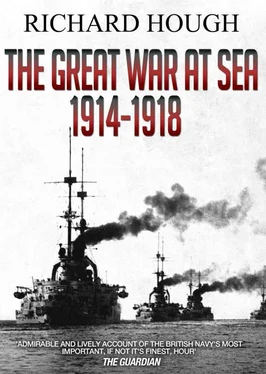The date agreed with the First Lord, Reginald McKenna, and others in the Cabinet was 25 January 1910, his sixty-ninth birthday. On the King’s birthday a few weeks earlier Fisher had been raised to the peerage as Baron Fisher, an almost unprecedented honour for a naval officer in peacetime. Beresford was livid.
There can be no question that Fisher laid the foundations upon which the Royal Navy of 1914 was built and that he did much of the subsequent structural work, too. In his earlier years Fisher had entered upon the Royal Navy scene like some gift from Neptune, performing prodigies on behalf of gunnery, torpedoes, mines, manning and many other departments. Those in the ‘Fishpond’ found themselves thinking more radically and working with a new pace and energy. He was a great inspirer and attracted stalwart loyalty, and his charm could be irresistible. Of medium height and unspectacular appearance, he remained one of those rare people whose presence could be felt in any gathering.
Fisher’s mind was crisp and deep, his memory prodigious. Such was his dedication to the Navy that his marriage to a worthy but colourless woman faded. But he loved the company of women and they loved him in return, from Queen Alexandra to Pamela McKenna and the Duchess of Hamilton, with whom he shared a deep relationship for the last fifteen years of his life.
Fisher’s work in Whitehall from 1904 to the end of 1909 stands unique in British naval history. While Tirpitz, starting from scratch, worked wonders in creating a superb fighting force in some fifteen years, Fisher’s task was infinitely more difficult. He had to break outworn traditions, and like Hamlet ‘reform it altogether’. A servant given an hour to clean a house has no time for tenderness with spiders. Fisher’s broom was wielded without restraint. His enemies within the service multiplied with the passing of years and his own certainty in the urgency of his task. There was a touch of waspishness in the man and his enemies’ accounts of his vendettas were mostly true.
The state of the Navy when he came to supreme power, although improved on what it had been ten years earlier, remained largely inefficient. His reforms in every department, from the fundamentals of warship design, i.e. HMS Dreadnought , and the virtual creation of a submarine service, to the eradication of time-serving sinecurists like the department responsible for the distribution of cutlasses to HM ships in 1905, were swift and complete. (This last reform was shortlived. Cutlasses were retained on board RN ships throughout the 1914-18 war.) Fisher prepared the Navy for modern war in 1914 on the greatest scale. It was not by a wide margin a perfect service. It lacked, for example, the support of an experienced Naval War Staff, which was introduced after his resignation. But, as an unprejudiced admiral remarked as he surveyed the Fleet assembled for review a few days before the outbreak of war, ‘All that is best and most modern here is the creation of Lord Fisher.” (10)
Winston Churchill was one of his warmest admirers and became one of his closest friends. While opposing Fisher’s demands for increases in expenditure by the Navy, he had been watching him closely and concluded that ‘There is no doubt that Fisher was right in nine-tenths of what he fought for. His great reforms sustained the power of the Royal Navy at the most critical period in its history… After a long period of serene and unchallenged complacency, the mutter of distant thunder could be heard. It was Fisher who hoisted the storm-signal and beat all hands to quarters.’
Without Fisher’s work Britain could not have survived against Tirpitz’s magnificent High Seas Fleet from 1914. If Britain had lost the war at sea she would have been forced to surrender, succumb to the tide, and become a subservient satellite.
But Fisher’s departure from the Admiralty was by 1910 essential. The overdose of the purgative was already having damaging effects. ‘He shook them and beat them and cajoled them out of slumber into intense activity,’ concluded Churchill, qualifying his summary: ‘But the navy was not a pleasant place while this was going on. The “Band of Brothers” tradition which Nelson handed down was for the time, but only for the time, discarded.’ (11)
After accepting the necessity for his resignation, Fisher began to understand how tired he was after his arduous campaigns. He told Esher of his ‘relief to be free of having to run the British Navy all over the world. It makes one think of St. Paul! “And besides all this, there came upon me the daily care of the churches.” (12)
He had often spoken facetiously of retiring to the country to grow cabbages. He did settle at his son’s home, Kilverstone Hall in Norfolk. But there was no gardening there for him. His interest and active participation in things naval and political was in for a brief hibernation, no more.
CHURCHILL AT THE ADMIRALTY
Churchill becomes First Lord following the Agadir Crisis – Admiral Wilson superseded – Churchill’s over - extended travels , lack of tact , and disagreement with the King – The 15 - inch gun and Queen Elizabeth class of super - dreadnought – Churchill switches the Navy to oil – His enthusiasum for submarines and aviation – Fisher’s support and guidance – Percy Scott’s director and the opposition to it – Dreyer’s fire control system – The creation of a Naval War Staff – Lower deck reform
Winston Churchill’s interest in the Royal Navy and his romantic affection for it had been known to his friends for some time. He also entertained a deep sense of admiration and affection for Fisher, which incidentally was not shared by Churchill’s wife, who felt only suspicion and distrust for him.
On Fisher’s resignation Churchill wrote to him, congratulating him on his elevation to the peerage as well as on the ‘great services you have rendered to British Naval Supremacy’. He also ruefully recounted how, since he had been at the Home Office, he had ‘stretched out several feeble paws of amity – but in vain – & I am only sorry that the drift of events did not enable us to work together… I have deeply regretted since that I did not press for the Admiralty in 1908. I think it would have been easily possible for me to obtain it. I believe it would have been better for us all’ (1)
Asquith had been aware for some time of Churchill’s wish for the Admiralty. and less than two years after Fisher’s resignation he offered it to him. Fisher had been superseded by a sturdy, steady, dour old salt, Admiral of the Fleet Sir Arthur (‘old ‘ard ‘eart’) Wilson, upon whom Fisher relied to sustain his policies and methods. Lacking the fiery stimulus of Fisher as his partner, McKenna did not thrive. On 25 October 1911 McKenna was transferred to the Home Office much against his will, and Churchill crossed Whitehall and exchanged jobs with him. ‘As soon as he [McKenna] had gone,’ wrote Churchill of this crowning moment, ‘I convened a formal meeting of the Board, at which the Secretary read the new Letters Patent constituting me its head, and I thereupon… became “responsible to Crown and Parliament for all business of the Admiralty’. I was to endeavour to discharge this responsibility for the four most memorable years of my life’. (2)
Asquith’s concern about the readiness of the Navy had been intensified during the diplomatic conflict in Morocco between France and Germany, which also affected Britain. In the spring of 1911 the French despatched a small military force to Morocco, ostensibly because French lives in that country were threatened by a revolt against the Sultan of Morocco. The Germans rightly suspected that this was only a first move towards part-annexation, which would thwart the long-term German intention of establishing a naval base on the Atlantic coast.
Читать дальше












